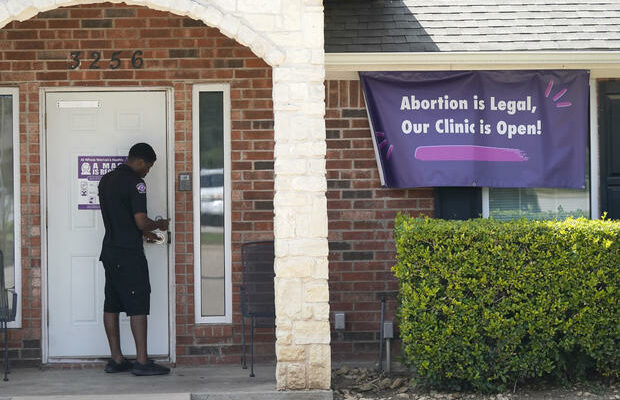Texas upends legal landscape with Supreme Court decision on abortion ban

The novel mechanism for enforcing the abortion measure in Texas, the nation’s most restrictive, was at the crux of the Supreme Court’s 5-4 decision to allow the law to remain in effect, as the conservative majority said abortion providers seeking to block the law did not meet their burden with the “complex and novel” procedural questions presented with their request.
“Anti-abortion legislatures are just watching what happens in Texas, and if Texas gets away with this, absolutely they’re going to start passing them all over the country,” Jessie Hill, a law professor at Case Western Reserve University, told CBS News.
Already, Texas Right to Life, an anti-abortion rights group, said following the Supreme Court’s decision that it “hopes to replicate our success across the nation.” And in Florida, state lawmakers have said the legislature intends to consider a bill mimicking Texas’ law in light of the Supreme Court’s decision, according to WFLA.
“We cannot as a movement, if we’re trying to get to our policy goal of saving pre-born lives and offering better alternatives to women, we cannot depend on district attorneys to get us there. We cannot depend on criminal penalties to do that,” John Seago, legislative director of Texas Right to Life, told CBS News.
Under the law’s enforcement scheme, private citizens rather than state officials are authorized to file civil lawsuits against alleged violators of the law — clinics, providers or even people who help a woman get an abortion — in state courts and provides a monetary incentive for them to do so. If a suit is successful, the plaintiff is entitled to at least $10,000 from the violator.
The mechanism, however, complicated efforts by the abortion providers who are seeking to stop the law from taking effect, as it was unclear exactly who they should sue.
“Most abortion restrictions that we see are enforceable as criminal laws, they have criminal penalties, and when the legislature passes a law like that, it’s easier to bring a case ahead of it going into effect to get it blocked,” Hill said. “When there is a crucial law you are claiming is unconstitutional, you’re asking the judge to say because the law is unconstitutional, the defendant cannot enforce the law. The judge has to be ordering someone to do something or not do something.”
Typically, attorneys general or local prosecutors would be ordered by a judge not to enforce a law. But because Texas’ abortion ban is only enforceable by private parties, “there is no criminal mechanism, no state medical board action, it’s just private lawsuits. There was no obvious person for the clinics to sue and for the judge to order not to enforce the law,” she said.
Texas Governor Greg Abbott, a Republican, signed the state’s so-called heartbeat act, known as Senate Bill 8, into law in May. Abortion clinics in the state filed a lawsuit in July to block the law, arguing it “blatantly” violates Roe v. Wade, the 1973 landmark Supreme Court decision that established a woman’s right to an abortion.
The groups named as defendants every state court trial judge and clerk in Texas, three state boards, the attorney general and the director of Right to Life East Texas, who threatened to sue under the law. Each of those parties, they said, will play a role in enforcing the abortion ban, with the state trial courts deciding the disputes and the clerks accepting the civil cases for filing.
But Hill said suing state court judges created its own complication, because they are shielded from civil suits.
“The key question is whether [the case] can be brought against the defendants,” she said of the legal battle that landed before the high court. “The law is clearly unconstitutional under the current laws, there’s hardly an argument that it’s not. But it’s hard to get into court to prove that.”
Abortion rights supporters and the clinics argued the Texas law was designed with that goal in mind — to insulate the law from federal court review and make it difficult to stop it from taking effect.
“By asking the public to enforce this law, Texas politicians are encouraging private individuals to do their dirty work,” said Marc Hearron, senior counsel at the Center for Reproductive Rights. “Texas is also purposefully trying to evade accountability in the courts. This scheme makes a mockery of our legal system.”
The four justices who dissented from the Supreme Court’s decision late Wednesday acknowledged the novel approach by the Texas legislature and lambasted their colleagues in the majority for allowing its tactic to go unanswered.
“The statutory scheme before the court is not only unusual, but unprecedented,” Chief Justice John Roberts wrote in his dissent. “The legislature has imposed a prohibition on abortions after roughly six weeks, and then essentially delegated enforcement of that prohibition to the populace at large. The desired consequence appears to be to insulate the state from responsibility for implementing and enforcing the regulatory regime.”
Justice Sonia Sotomayor, in a searing dissent, said the majority “rewarded the state’s efforts to delay federal review of a plainly unconstitutional statute” and accused them of opting to “bury their heads in the sand.”
After the Supreme Court failed to act before the law took effect at midnight Wednesday, followed by its decision not to block it nearly 24 hours later, providers in Texas moved to severely curtail abortion services to women in the state. Whole Woman’s Health, which operates four clinics in Texas, said it will only provide abortions if no cardiac activity is detected in a sonogram, and Planned Parenthood of South Texas said in a notice on its website it is “unable to provide abortion procedures at this time.”
Hill said the providers in Texas are now left with two choices: They can either comply with the law, and many clinics say they are doing so, or openly flout it to force a lawsuit and mount a defense that the measure is unconstitutional.
“That’s a good defense in the sense it’s clearly right, but it’s very risky,” she said.
Under the law, multiple civil lawsuits over one procedure can be filed across the state against an abortion provider or person who helps a woman obtain an abortion.
“It creates a situation where even if the defendants in those cases were to win every single case — and just to be clear we think every single case that would be filed is clearly unconstitutional under Supreme Court precedent for 50 years — even if the defendants were to win every single case, the burden of having to defend themselves, of having attorneys, of spending their time having to go around in rural courts all over Texas, 258 counties defending themselves, that alone threatens to stop the provision of abortion access across the state,” Hearron told reporters Wednesday.
Texas Right to Life launched a website to solicit anonymous tips about possible violations of the law, but the group declined to say how many tips it’s received since the measure took effect.
Seago, the group’s legislative director, said they have not heard of “any credible reports of violations.” He has, however, heard from other states about drafting similar laws.
The legal battle over the Texas law is in the early stages, as proceedings are also taking place in the federal appeals court. The measure can end up before the Supreme Court again, either on appeal from the Texas Supreme Court if a case is brought against a provider for breaking the law, or after progressing through the lower courts.
“This law is such an affront to judicial authority, the judicial system, to how lawsuits are supposed to work, equal treatment of litigants in the eye of the law, all those principles, I can’t imagine in the end the U.S. Supreme Court is going to OK it,” Hill said. “I can’t fathom it.”
For now, anti-abortion advocates are encouraged by the decision by the Supreme Court to let the law stay in place, as it marks the first so-called heartbeat bill to take effect. That success, though, also sets the stage for future laws involving hot-button issues beyond abortion that model the Texas measure.
“What’s now to stop blue states from passing gun laws that say, ‘you can sue anyone for any handgun sale, have at it’?” Hill said. The Supreme Court ruled in 2008 that the Second Amendment protects the right to have firearms in the home for self-defense.
Hearron agreed, saying there should be widespread concern with the success of the Texas legislature’s enforcement scheme thus far in making it hard for the federal courts to intervene.
“If a state can simply outsource its enforcement authority to private citizens, deputize them to sue people for simply exercising a fundamental right that’s recognized by the Constitution in the Bill of Rights, then that allows any state to attack any individual right that’s recognized and a fundamental right in the Bill of Rights,” he said.
You Might Also Like



